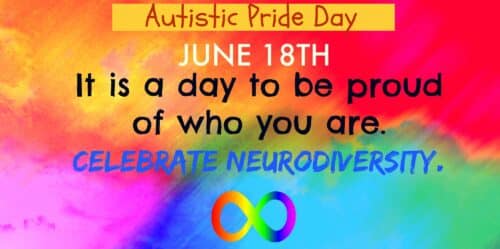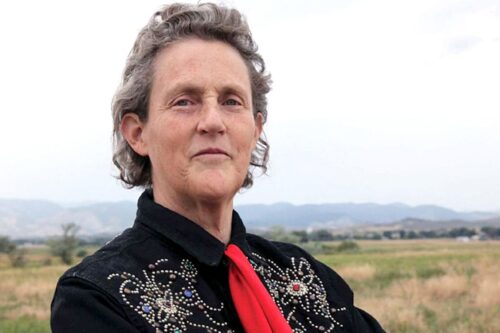Autistic Pride Day: June 18 Promotes Positivity of Being Unique
Every June 18, the autism community around the globe marks Autistic Pride Day. This is a day that involves celebrating our differences and honoring the unique perspectives, abilities, and voices of autistic individuals who have for too long been misunderstood and marginalized by society.

While it’s a lesser-known observance, many autistics find its significance of autism pride greater than March’s Developmental Disabilities Month or even April’s Autism Awareness Month, because it is directly driven by the autistic community.
As an autistic adult myself, I support the special day of celebrating our differences (which again, is any day, and every day), because it is not an overly-commercialized, one-day-and-done event. I like how the autism pride event leaves the door open on how to show our true selves, but more than anything else, empowers autistics to love themselves for who they are and promotes individuation.
What Autistic Pride Day Is … and Isn’t
Autistic Pride Day utilizes the rainbow infinity symbol and not the puzzle piece or color blue, as another organization promotes. The reasoning is that it represents diversity with infinite variations and infinite possibilities. It also utilizes the theme, “Every Day,” with the mission of celebrating our differences championing the rights, needs, and aspirations of autistic individuals every day.
The event was created by Aspies for Freedom (AFF). Activities can range from large events, in-person and online celebrations, picnics, gatherings, or even connecting through chat rooms and finding ways of celebrating our differences and promoting autism pride positively.
AFF explains the day’s purpose like this: “It is important for us to spend a day each year enjoying our autism with our family and friends, whether online or offline because there can be so many negatives in the media about autism, we feel it is important to rebalance with positive events.”
Autistic Pride Day is not associated with the gay pride movement, but the event was modeled after it in recognition of the significance of autism pride in being able to foster positive change. Today’s purpose is just that: for individuals on the spectrum to be proud of who they are.
The event also serves to reframe negative perceptions of needing to find a “cure” to autism and to correct inaccurate myths that still surround autism today. While most in the autism community laud Dr. Temple Grandin for being a pioneer and opening many doors for individuals with autism, Autistic Pride Day is not named after her or to celebrate her achievements.
However, since I’ve brought autism and Temple Grandin up, I would like to mention her trailblazing efforts and being among the first to truly promote autism positively and respectfully, which have inspired us to use our voices and enjoy celebrating our differences.
Key Principles and Goals of Autistic Pride Day
There are five key principles I’ve found as they relate to this annual celebration. They include:
1. Self-Acceptance and Identity Affirmation
At its core, Autistic Pride Day encourages neurodivergent individuals to develop self-acceptance and affirm their identities. It empowers them to embrace their unique neurological wiring, reject the notion that they need to be “cured” or converted to fit societal norms and take pride in their authentic selves. This celebration of authenticity aligns with the broader neurodiversity movement, which values the diversity of cognitive functioning within humanity.
2. Raising Public Awareness and Understanding
Autistic Pride Day events and initiatives play a crucial role in promoting greater public awareness and understanding of the broad autism spectrum. They aim to challenge misconceptions, inaccurate stereotypes, and harmful myths surrounding autism. By amplifying the voices and experiences of autistic individuals, allies, and advocates, these efforts help foster more compassionate, well-informed, and supportive communities.
3. Supporting Autistic Culture and Celebrating Our Differences

4. Advocating for Rights and Inclusion Along With Autism Challenges
Autistic Pride Day is also a powerful advocacy tool, providing a global stage for the autism community to demand their civil rights, equal opportunities, and full inclusion across all spheres of life. This includes access to quality education tailored to individual needs, fair and supportive employment practices, independent living resources, and representation in policy decision-making processes that directly impact their lives.
5. Fostering Acceptance and Belonging
Ultimately, the day (whenever it is observed) aims to foster a world where neurodiversity is genuinely accepted, valued, and accommodated. It challenges society to examine its rigid societal norms, communication styles, and sensory environments that can create barriers and exclusion for those on the autism spectrum. By promoting inclusive practices, universal design principles, and a deeper appreciation for cognitive diversity, this celebration paves the way for more welcoming and supportive spaces where autistic individuals can truly belong and thrive.
The Power of Autistic Voices and Self-Advocacy
A hallmark of the Autistic Pride movement has been the increasing prominence and empowerment of autistic self-advocates and their allies. For too long, narratives surrounding autism have been dominated by non-autistic perspectives that sometimes portray autistic individuals as burdens or tragic figures.
Events typically focus on autistic voices, experiences, and perspectives in shaping conversations, policies, and initiatives that impact our lives. With this shift in focus, they shed light on experiences and unique challenges faced by autistic individuals from diverse backgrounds, including women, ethnic minorities, LGBTQIA+ individuals, and those with co-occurring disabilities.
By sharing our lived experiences, successes, and struggles, autistics can directly inspire a deeper understanding of the autism spectrum’s vast complexities. Stories about overcoming obstacles and being successful help to underscore the importance of recognizing each individual’s autonomy, respecting preferences and communication styles, and empowering individuals to make informed decisions about their own lives.
A Celebration of Diversity and Human Potential

As we consider our versions of autism pride, I hope we can reflect on the progress made in celebrating our differences and fostering understanding and everyone also recognizing the ongoing challenges and barriers that still exist. Together, as members of the autistic community, can renew our commitment to dismantling stigma, promoting equity, and embracing neurodiversity as an integral and invaluable part of the rich tapestry of humankind.
These celebrations remind us that every mind is a masterpiece, and by embracing our collective cognitive diversity, we open ourselves to new frontiers of innovation, creativity, and human potential. It is a day to celebrate the unique gifts, perspectives, and contributions of those on the autism spectrum, and to build a more inclusive, understanding, and neurodivergent-affirming world for all.
Embracing Neurodiversity and Moving Beyond the Medical Model
Historically, autism has been viewed primarily through a medical lens, with a heavy emphasis on identifying and attempting to treat perceived deficits or impairments. However, the Autistic Pride movement challenges this narrow and often stigmatizing perspective, advocating for a more holistic and affirmative approach that recognizes autism as a natural variation in human neurology.
Critics of the medical model argue that it pathologizes neurodivergence and perpetuates the false notion that autistic individuals need to be “cured” or “fixed” to conform to societal norms. In contrast, the autism pride movement celebrates and values the worth and unique strengths of autistic individuals. It recognizes that autism is a fundamental aspect of human diversity that should be respected, accommodated, and nurtured. And, who can argue with that?
Creating Inclusive and Accommodating Environments
The positive self-advocate movement also challenges societal norms and structures that have traditionally marginalized and excluded neurodivergent individuals.
Some areas of positive focus for living the best life possible include:
Sensory-friendly spaces:
Many autistic individuals experience sensory processing differences, which can make environments with bright lights, loud noises, or overwhelming stimuli challenging to navigate. Designing sensory-friendly spaces with adjustable lighting, quiet areas, and accommodations for sensory needs can enhance inclusion and comfort.
Communication accommodations:
Embracing diverse communication styles and providing alternative means of expression, such as visual aids, augmentative and alternative communication (AAC) devices, or accommodations for non-verbal individuals, can facilitate more effective and respectful interactions.
Educational and workplace accommodations:
Implementing accommodations like extended time for assignments, quiet workspaces, or alternative assessment methods can support autistic students and employees in achieving their full potential without compromising their authentic selves.
Community inclusion:
Promoting inclusive social activities, recreational opportunities, and support networks can foster a sense of belonging and connection for individuals on the autism spectrum, combating isolation and promoting overall well-being.
Celebrating Autistic Culture and Achievements
Autistic Pride Day also serves as a vibrant platform to celebrate the unique perspectives, talents, and achievements of autistic individuals across various fields. From art and literature to science and technology, autistic individuals have made invaluable contributions that have enriched our collective human experience.
Art and literature have long been powerful mediums for autistic individuals to express their distinct perspectives and creative visions. Authors and artists on the spectrum have produced thought-provoking works that challenge societal norms, shed light on the autistic experience, and invite us to see the world through their unique lenses.
In the realm of science and technology, autistic individuals have pioneered groundbreaking innovations and pushed the boundaries of human knowledge. Their attention to detail, pattern recognition abilities, and out-of-the-box thinking have led to remarkable breakthroughs in fields such as mathematics, computer science, engineering, and beyond.
Celebrating Our Uniqueness and Remembering Our Role Models

While I don’t do outwardly “large” ways of celebrating who I am, I do plan to reflect on the vision of autism and Temple Grandin this year on Autistic Pride Day. I’m hopeful that we are beginning to experience a world where the extraordinary capabilities and rich neurodiversity of humankind are finally understood, accepted, and embraced without exception.
Imagine a world where every person—like me and like you— has equitable pathways to achieve our dreams and make our imprint, in our unique way. A world where autistic individuals are welcomed, empowered voices whose perspectives are heard and valued.
And, that’s why I am proud of who I am. How about you? I’d love to hear your thoughts or comments!
Common FAQs About Autism Spectrum Disorder
- What Are 25 Common Traits of Autism Spectrum Disorder?
- Do You Know Your Flavor of Autism Spectrum Disorders?
- Are You Addicted to Social Media? How To Face the Real World
- Hope for the Future: Will It Transform the Autism World?
- Am I Neurodivergent? Understanding Neurodiversity and Its Value is Key
- Autism Questions: 6 FAQs You Really Want to Know
- Do You Have Autism on the Brain? Unpacking the Meaning Behind Neurodiversity
- Is Autism A Disability? Surprising Reasons for the Debate
- Alexithymia Symptoms: Is Emotional Blindness A Thing?
- Top 25 Hurdles Autistic Individuals Face Daily